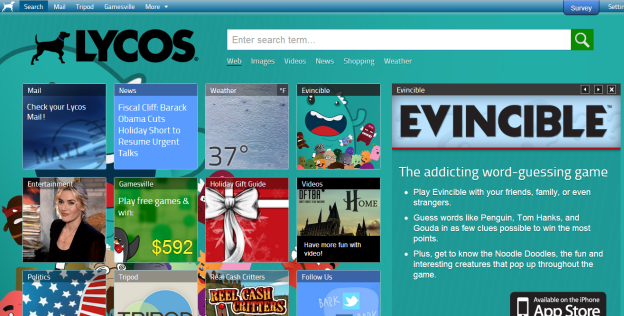
Dogpile, AltaVista, Netscape, Excite, and Ask Jeeves were some of the search engines competing in the 90s for your searches before Google solidly became the household name. Lycos was also among them, but faded into relative obscurity. However according to a report from TheNextWeb, Lycos’ search engine is planning a revamp that’s set to launch in 2013.
Though details are scarce, CEO Rob Balazy is already talking about how the product will compete with the likes of Bing and Google. What we know so far is that Lycos is shedding its Yahoo-dependent search results. And the way the search engine will work is contrary to how search engines are used and display information today. Google, Yahoo, and Bing require that users click on links that open up a new page in a new window, but this won’t be the case with Lycos, according to Balazy. Users will be able to view content within the search engine automatically.
“In the coming year you will see us introduce a new proprietary search product. I don’t want to say too much about it as it’s still in the planning stage but we have a vision to merge the notion of a search-type activity with a curated content experience,” Balazy says.
From the sound of it, Lycos is planning on butting heads with Bing. Google on the other hand is too large to take on at this point so Balazy indicates that Lycos is distancing itself from the search behemoth.
“Google’s big push has been to index the entire Web and be the definitive ‘Library of Congress for the Web’. We’ll focus more on the head terms, the search queries that are important and matter to people and really focus on the presentation layer, making the user experience really intuitive, really beautiful and take the same data-driving approach we’re doing with our homepage,” says Balazy.
Then there’s the fact that despite Bing’s overt efforts to sway Google users toward the more social search engine that is Bing, in December 2012 Google still commands an 88.8 percent market share according to Karmasnack, which measures global website traffic. Bing and Yahoo both trail behind with 4.2 percent and 2.4 percent market shares respectively. If Microsoft has been having a difficult time of changing the Google user’s habits, Lycos will need to get lucky in order to capture some significant market share.


